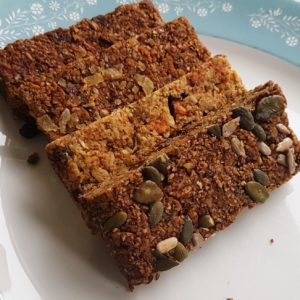Diabetes, Faxipedia, Flaxfarm, Food, Gluten-free, Health, OMS, Overcoming Multiple Sclerosis, Vegan, Vegan, Weight control
A Whole Food Plant-Based Diet & the Power of Flax for Health
A Whole Food Plant-Based (WFPB) diet is a term coined by biochemist T. Colin Campbell, author of The China Study (source). It refers to a diet primarily based on plant foods, with minimal or no animal products, and as little processing as possible—certainly no ultra-processed foods (UPFs) or artificial ingredients. A simple way to describe it is: “Nothing bad added, nothing good taken away.” This often means preparing meals from scratch using wholesome ingredients.
Importantly, WFPB is different from generic “plant-based” foods, which can still be highly processed and lack the nutritional integrity of a whole-food approach. Flax Farm WFPB flaxseed products are full of fibre and other important nutrients that our modern foods can be short of, so adding our flax foods to your diet can give you a beneficial win that you’ll probably start to notice quite quickly.

Fibre for Health & Weight Control
Whether you’re looking to lose weight, improve digestion, or enhance overall health, increasing fibre intake through a WFPB diet can be a game-changer. Higher fibre consumption is linked to better blood sugar control, improved cholesterol levels, and a healthier gut microbiome.
A key benefit of WFPB eating is its focus on naturally occurring fibre while minimizing salt, eliminating saturated fats, and avoiding UPFs. Fibre isn’t just an inert part of food—it plays an active role in digestion and supports overall health in multiple ways.
Flax, Fibre & Appetite Control – Natural GLP-1 Support
Fibre physically fills us up, helping control appetite naturally. One of its key mechanisms is the ileal brake, which stimulates the production of GLP-1—a hormone that signals satiety. This process occurs when undigested food reaches the final section of the small intestine, slowing stomach emptying and enhancing nutrient absorption.
Soluble fibre forms mucilaginous gel in the gut. Flax adds a particularly thick gel component to this get. This gel slows digestion, allowing undigested fats and nutrients to reach the ileum, triggering the ileal brake. This mechanism is one reason ground flaxseed is so effective for appetite control.
To see flaxseed’s gel-forming ability for yourself, try mixing a tablespoon of ground flax with a couple of tablespoons of warm water—within a few hours, you’ll see how thick and viscous it becomes! This unique property makes flaxseed particularly effective in supporting digestion and satiety.
If you’re looking for a natural alternative to medications like Ozempic or Mounjaro, increasing high-fibre foods—especially flax, beans, peas, and whole grains—can help regulate appetite and stabilize blood sugar. Adding ground flax to refined carbs can transform them from blood sugar-spiking foods into more balanced, slow-release sources of energy. This all helps to make weight control easier and more effective.
Flax, Fibre & Digestion
Fibre comes in many forms, each offering unique benefits. Both soluble and insoluble fibre contribute to gut health by increasing bulk and supporting peristalsis—the wave-like muscle contractions that move food through the digestive tract. This helps keep you regular and tummy comfortable .
Ground flaxseed is a whole food superfood, particularly beneficial for those following a WFPB diet. Many modern plants have been developed to be softer, sweeter and less fibrous which isn’t good for us; adding ground flaxseed in is a nice way to put back the natural fibre and goodness our foods should have.
Ground flaxseed provides fermentable fibre that nourishes the gut microbiome, promoting the production of short-chain fatty acids (SCFAs) such as butyrate, propionate, and acetate. These compounds help protect the gut lining, support immune function, and even benefit the rest of our body and brain.
If you’re new to a high-fibre WFPB diet, flaxseed can help ease the transition by supporting digestion and microbiome adaptation. Check out our WFPB product category for ideas on incorporating flax into your diet.
Flax Farm’s WFPB Foods:
- Ground Flaxseed, Bronze and Gold
- Whole Flaxseed, Bronze and Gold
- Flax Farm Flax Porridge and Muesli
- No Saturated Fat-Flaxjacks – While traditional purists might debate this, we know exactly how our flaxseed oil is made and believe these high-fibre, no-added-sugar treats align with a WFPB approach. Personally, they’ve been a satisfying, healthy option for breakfast or an on-the-go snack, helping me lose over a stone!

Special Free-from, no-added sugar trial mixed 4-pack: 1 x Carrot Cake, 1 x Courgette & Apple, 1 x Fruit Cake and 1 x Ginger Parkin
Flax & SCFAs – Supporting Gut Health & Beyond
Flax is a true superfood, offering exceptional support for digestion, immunity, and weight control. Its unique blend of fibres promotes gut health, fuels beneficial bacteria, and enhances SCFA production, which plays a role in everything from gut integrity to brain health.
Flaxseed is more than just a high-fibre food—it’s a whole-food powerhouse that nourishes your body from the inside out, especially benefiting digestion and gut microbiome balance.
Incorporating more flax into your meals is an easy way to start a Whole Food Plant Based Diet and experience the benefits of this powerful natural step towards better health and wellbeing.


